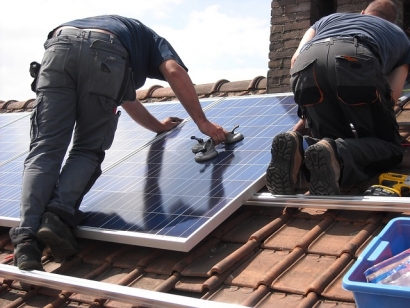
"But this article is supposed to be about installing solar" I hear you saying. Right you are. However, to find out if installing solar power is worth it, we need to understand where the value streams come from. When it comes to our buildings, homes, and our energy systems, there are many.
What I want to focus on here is the value case of generating on-site electricity, storing it for future use, some electrification opportunities, and a few things to keep in mind when considering a solar installation.
First off, and to many the most important, is the financial benefit from reducing electricity costs. It’s pretty straightforward – the sun comes out and you save money. However, there’s far more to consider than just lowering electric costs.
Installing PV at your new facility, property, or home, has builder value, too. This could include marketing the facility to sustainably minded clients. It increases the value of your property (single family homes show a 4.1% average increase in sales which is over $20,000 on a $500,000 house).
You can gain tax credits and accelerated depreciation if you intend to hold the property. Solar canopies provide great shade amenities and make electricity for common areas simultaneously. There are benefits indoors as well.
Let’s look at cooking. Will kids occupy the home? Are you installing gas cooking? A meta-analysis of 41 studies found that kids growing up in a home with gas stoves were 42% more likely to experience asthma symptoms and 24% more likely to be diagnosed with asthma in their lifetimes. So, considering value, market the safety and medical savings even if there may be additional cost to electrify the cooking appliances.
Let’s look at heating next. New variable capacity heat pumps can take the place of the common gas furnace, and gas water heaters can be changed out to heat pumps as well. Today’s heat pumps have efficiencies about four times that of natural gas heating (both comfort and water heating) so even though gas is cheaper than electricity per unit of energy, the efficiency of a heat pump makes them cheaper to operate.
Not having to run natural gas to the property, placing a meter, running gas lines in the building, has significant savings, sometimes greater than the cost of going fully electric in the first place. Additionally, solar panels have an average life of 32 years. Adding more PV panels after the initial build is far more expensive than just adding some more panels at the first install.
When considering Solar PV, don’t just look at what the electricity cost projections are this year, but look at what it might be five to 10 years from now. It’s wise to analyze both the design and expandability of a system with the intention of meeting the occupants’ future needs up front to increase perceived value.
Considering storage, the time of day you use energy matters, too. Is this a working professional’s home? Will business equipment or appliances run inthe peak evening hours? ‘Peak Demand’ pricing makes each kilowatt hour used in peak hours more expensive.This is where Battery Energy Storage Systems (BESS or ESS) might come in. Batteries don’t save energy, they save money IF peak demand rates affect the bill.
A battery is an agent of arbitrage. You simply fill it up with energy when rates are cheap or even free from your solar PV, then ‘sell’ this energy back when rates are high through Net Energy Metering. Buy low, sell high. There are many restrictions here, but there are also incentives. Ask your energy professional if battery storage is right for you. Side effects may include huge savings, huge costs, and or resiliency. Additionally, a BESS can reduce the number of panels required to install under 2019 Title 24 saving roof space and penetrations.
Is solar really worth it? Attracting more affluent and health conscious clients or tenants, gaining resiliency, improving indoor air quality through electrification, reducing envelope penetrations, saving money while saving the planet? Yes, solar is worth every penny.
Wayne D. Alldredge, LEED AP, ENV-SP, CEM, CEA is Associate Director of Energy, O&M, and Commissioning Services for VCA Green. He is a Consultant, Educator, and Volunteer.walldredge@vca-green.com

